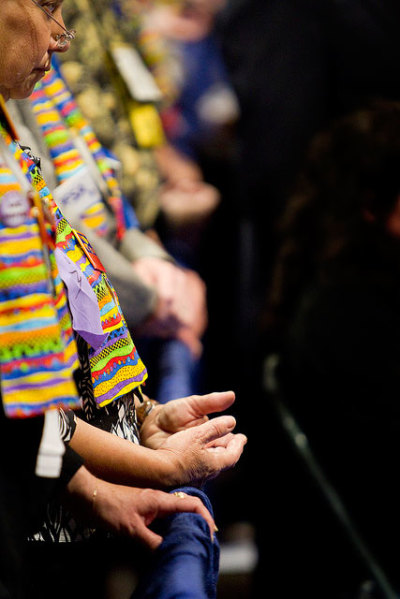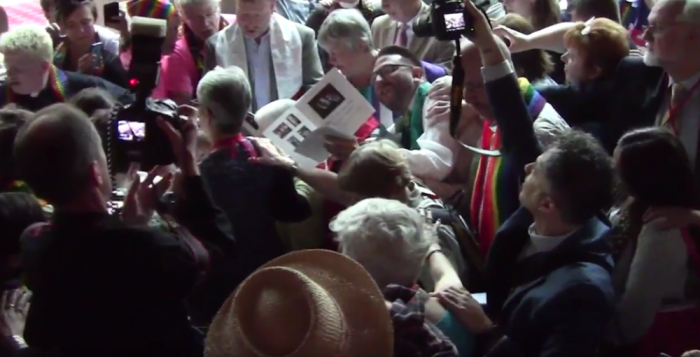LGBT Affirming Methodist Clergy Perform Mock Ordination for Non-Celibate Lesbian

A group of United Methodist clergy who support ending the Church's ban on ordaining non-celibate homosexuals performed an unofficial ordination service for a lesbian.
Sue Laurie, a longtime LGBT activist, was ordained in an unofficial ceremony held at the United Methodist Church's General Conference in Portland, Oregon, last Tuesday.
According to Barton Dempsey of the theologically conservative Institute on Religion & Democracy, this ceremony "has no standing" even though several UMC clergy took part.
"Joining Laurie were a number of liberal caucus groups advocating for changes to United Methodist teachings, ordination standards, and prohibitions on non-celibate active gay clergy," wrote Dempsey.
"The ceremony has no official standing in the denomination, which does not permit 'self-avowed, practicing' homosexuals to be ordained."
Every four years, delegates from the global United Methodist Church meet at General Conference to debate church law.
For decades, General Conference has been the sight of emotional debate over the Church's longstanding position against homosexuality and gay marriage.
According to the UMC Book of Discipline, homosexuality is "incompatible with Christian teaching," with the denomination prohibiting clergy from performing gay weddings and barring non-celibate homosexuals from being ordained.
Nevertheless, debate over removing these passages from the Book of Discipline has garnered headlines and much internal dissent.
In advance of the 2016 General Conference, over a dozen regional bodies or Annual Conferences passed resolutions demanding the so-called incompatible language be removed.
At least nine more Annual Conferences either passed resolutions in support of the current language or voted down petitions calling for its removal.
In the 2012 General Conference vote that upheld the language in support of the biblical definition of marriage, supporters included delegates representing overseas Annual Conferences, especially in Africa.
The fastest growing wing of the global body, the African delegates at General Conference, have been credited by some as being the key reason why the language survived its most recent challenge.
Last November, a group of African bishops signed onto a statement demanding that the UMC both make a greater effort to tackle the issue of international terrorism and to maintain its official position on sexual ethics.
"African bishops called on The United Methodist Church to confront global terrorism and hold the line on church teachings regarding human sexuality," reported Heather Hahn of United Methodist News Service.
"They noted that Church teachings only affirm sexual relations in monogamous, heterosexual marriage, and not in same-sex unions or polygamy."
Similar to past debates on homosexuality in other Mainline churches, some in the denomination fear that the debate will eventually result in a schism among United Methodists.





























